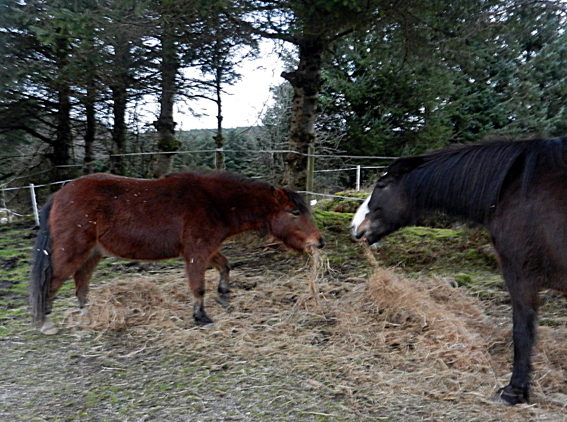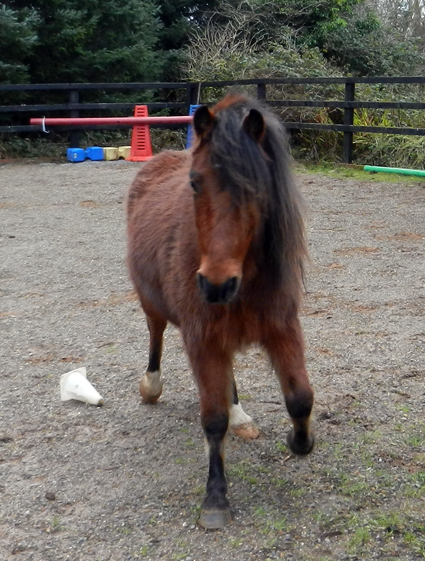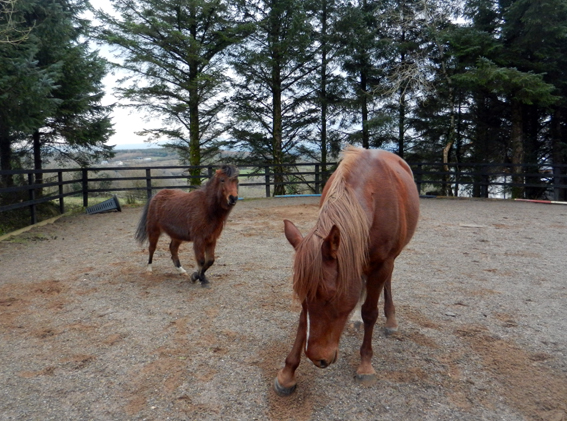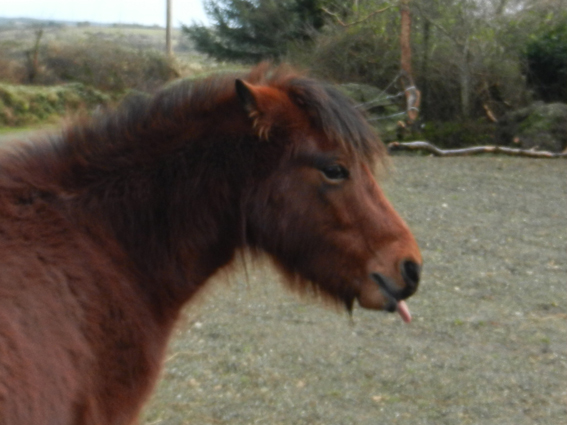Arrow is a clever pony and that is just as well, because he has a lot to learn. He is a good example of what happens to a horse when they get weaned too young and then spend the following years on their own: they don’t learn how to be a horse. It is a common practise in Ireland to keep a solitary mare and foal. That is because a lot of farmers only have a single mare that they breed. Others keep mare and foal separate because of a prevalent and mistaken belief that other horses might hurt the foal. Then, at the end of the summer, the foal is weaned.
In the wild, horses are usually weaned when they are nearly a year old. Weaning takes place gradually – the mothers discourage their young from suckling and do not produce as much milk, and so the foals gradually come to rely on other sources of food. In contrast, domestic horses are generally removed from their mothers abruptly and at a much earlier age, often as young as 4 months old. That this is extremely stressful for the young animal, who is suddenly deprived of the emotional security that his mother provides as well as its main source of nourishment, goes without saying. To compound the situation, the foal might even find itself on its own.
These practises have consequences for the way the foal learns; an animal’s existence involves receiving and interpreting signals from its environment and responding appropriately, whether these are social ‘pressures’ or the signs that indicate possible danger or attack by a predator. Young animals have to learn to respond to almost unobtrusive signals and to offer them in return in order to integrate properly in the herd. Without other horses, the isolated youngster won’t acquire any of the behaviours that are not inborn.
Arrow was 4 months old when he was weaned and after that he never saw another horse until he came here and met Minnie and Cassie. It was interesting that initially, although he was nearly 3 years old, he behaved like a foal, even going so far as to try to suckle from Minnie, and I wonder if that was because it was the only behaviour he remembered in relation to other horses or if he regressed because his suckling needs weren’t satisfied at the time. Whatever the reason, that particular behaviour didn’t last long. Since then, he has tried to establish his position in the herd. He started by showing his gratitude to his surrogate mother by pestering Minnie off her food. Minnie is inclined to yield to other horses rather than attack, although she can be quite aggressive when someone oversteps the mark, but in the end she always ends up bottom horse. Unfortunately for her, Arrow is persistent, and no matter how many piles of hay I put down, he will always want hers.
 Now, Cassie will do the same thing; if Minnie has a pile of hay that she wants, she’ll drive Minnie off, but then she is content to eat and she will leave Minnie in peace at another pile of hay. Arrow however will keep driving her away, apparently just because he can, but I think it is because he just hasn’t learned when to stop.
Now, Cassie will do the same thing; if Minnie has a pile of hay that she wants, she’ll drive Minnie off, but then she is content to eat and she will leave Minnie in peace at another pile of hay. Arrow however will keep driving her away, apparently just because he can, but I think it is because he just hasn’t learned when to stop.
More recently, as he’s maturing and seems to be quite dominant by nature, he has been trying for the top position. But it’s clear that he doesn’t speak the language properly. Horses don’t want a leader that goes around shouting all the time. When Cassie wants Minnie to move, she looks at her purposely and she’ll flick an ear. Minnie will move and that’s it. No drama and the least amount of energy expended by both horses. Arrow doesn’t know how to do subtle signals and he doesn’t recognise them either. He might miss several warnings; for instance, although he himself walks around half the time with his ears pinned back, he doesn’t seem to have learned that another horse lays its ears back before it attacks, so he regularly gets bitten by Cassie even though Cassie is fairly tolerant and I’ve seen her give him several warnings before she attacks.
What is unusual is that Arrow often doesn’t challenge them directly; he waits until he has the element of surprise. He might wait for instance until one of the mares has gone down for a roll, and then when they’re on the ground with their legs in the air, he’ll charge in. Sometimes he might just sneak in behind one of them with his ears flattened, and although they are just walking around going about their business, it is clear from his face that he feels he’s in a position of power.Here he is coming in behind Cassie, while she’s scratching her leg.
To Cassie, that was a transgression that warranted immediate retaliation, so no warnings were given and she lunged at him instantly.
To the casual observer Arrow might seem a brave little horse; not only does he take being beaten up by Cassie in his stride, anything new, and he will go up and investigate. He will leave no stone unturned, no gate latched and no door unopened. He’ll barge through electric fencing and thorny hedgerows alike and there is no obstacle high enough or he’ll take it. He climbs banks and walls and jumps into ditches. He steps across the fence to raid the chicken feed and if in the process his legs get tangled in the mesh, he doesn’t panic but just eats the grass around his feet until I free him. He seems very good at thinking outside the box. But that is not it. Arrow just doesn’t see the box. He is oblivious to the possibility of danger.
A couple of days ago I was sitting inside, watching them graze. The three of them were at equal distances from each other. Suddenly, Minnie and Cassie’s heads both shot up simultaneously. Ears pricked, nostrils flaring, they were frozen for an instant in the same position, then they bolted. Arrow had continued to graze, and he only noticed something was up when clods of flying mud practically hit him in the face. By the time he had decided to follow, Minnie and Cassie were dots on the horizon. In the wild, Arrow wouldn’t last long, he’d be easy prey, but in the company of my mares, he’s finally learning how to be a horse. It is just unfortunate that in his company my mares are learning how to break out of the yard.





He’s such a BOY!!
Oh, he is, and as cute as they come!
Poor Arrow, he just doesn’t get it yet. I think eventually he will learn how to be a horse by being with the mares. It’s obvious he would be the first casualty if he lived in the wild. We have a few like that too. You can pick out the survivors and the not-so-much ones in our herd too.
Arrow reminds me a little bit of Sami who was a rescue too. I don’t know when he was weaned but I know he didn’t leave his stall for five years and was left a stallion (until we got him). Having never been turned out he ran the fence and was genuinely afraid when we took him outside. Again, with time around the herd he’s learned to be a horse. There are many nights he refuses to come in and spends the night outside with a buddy. He also thinks he should be boss but no one takes him seriously. I think he’s gotten an education in the three years we’ve had him from the other horses. He doesn’t pin his ears as much or push others off their hay anymore. He doesn’t even fight with Grady anymore, so he’s learning a little at a time.
Poor Sami, it sounds like he had a horrible time before you found him. He was so lucky to come to your herd. I do think for Arrow it would have been better if there had been more horses around instead of just the 2 mares. It might take him longer to learn…
Arrow, what you need is a good spanking!!
You’re right, he sounds as if he’s never learned proper equine etiquette. I would have said stick him out with a handful of high ranking mare and let them teach him manners..but it sounds as if Cassie and Minnie either don’t have the gumption, or Arrow has them completely bamboozled. He’s been gelded, has he not?
Argh, ponies. They’re not domesticated animals, not like horses. Arrow sounds entirely too smart for his own good!
Like CA said, he’s such a boy. I’ve met MEN like Arrow…little short guys who have this need to demonstrate that they are Real Men despite being short, so they go about being total jerks. . We call it the Little Man Syndrome. Sounds like Arrow has it in spades.
Is there a way you can separate him from the girls while they’re eating? I’d hate to think that Minnie is going to start losing weight because of Mr. Bad Boy.
Arrow has been gelded, but like you say, he is very much wild at heart. He is really full of himself and he makes me laugh the way he prances around, but you’re right, my mares are a bit too mild to teach him proper manners, although Cassie does give him the double barrel when he goes too far.
I keep Arrow separate from the mares at night when they stay in the yard. He can see them and touch them if they go up to him, but he has to stay in his own pen. Otherwise Minnie wouldn’t get her share of hay and he would eat far too much and Minnie would also end up standing in the rain if he felt like blocking her access to shelter.
He sounds a bit like George, who is definitely a “shouter”, and although one of our mares has allowed him “in”, the other two mistrust him still (after 3 years), and he them.
Isn’t that amazing? You’d think that after that time they would have sorted themselves out as a herd. I wonder what his life was like when he was a baby, have you any idea?
I don’t know, but my theory is that he was weaned too early and turned out unprotected as a baby with bigger, scary horses.
I really enjoyed reading your analysis of Arrow’s behavior. You summed it up well when you said that his problem is that “he doesn’t see the box”. That is definitely an issue for a horse. I used to ride a beautiful mare who was orphaned as a youngster. She was not isolated from other horses, but her behaviors were definitely different than other horses. She was very intelligent and seemed to think that she was “human” or at least on the same plane as humans. This was NOT a good thing for her handlers. She had issues for the rest of her life.
I have seen that as well in hand reared youngsters, and it’s very hard to re-socialise horses like that. With Arrow, I hope that we can still help him to become a better horse, at least to the point where he will have more acceptable social skills in the herd.